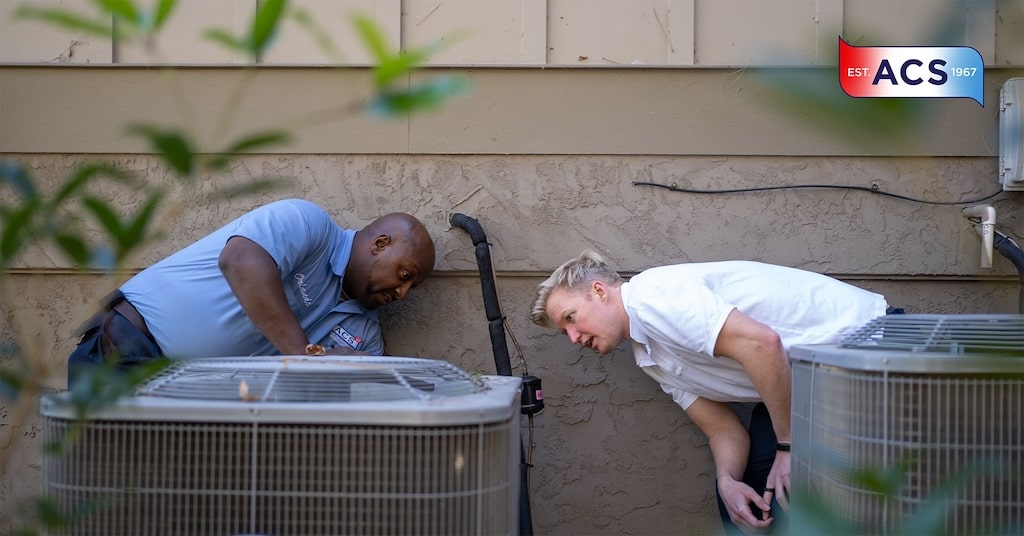When it comes to heating your home, you want to feel secure with your system of choice. However, with so many different options on the market, it can be difficult to determine which type of heating system is right for you.
Whether it’s a furnace or a heat pump, there’s no right or wrong answer when it comes to HVAC heating systems. But, if you’re leaning more towards a heat pump, let us share all the ins and outs of this ultra-efficient heating system. Read below for ACS’s expert guide on heat pumps to determine if a heat pump system is fit for your home.
What is a heat pump?
A heat pump is a dual HVAC system that works as both a heating and cooling system. A more energy-efficient alternative to traditional furnaces and air conditioners, heat pumps use electricity to transfer heat between cool and warm spaces. In the winter, your heat pump will move heat from the cool outdoors into your home. While in the hotter months, it will transfer heat from inside your home into the outdoors. This heat transfer, rather than the traditional generative method used in conventional systems, allows heat pumps to work efficiently and keep your home comfortable in various climates.
What are the types of heat pumps?
Heat pumps come in three different types: air-source heat pumps, geothermal heat pumps, and water-source heat pumps. The most common model is the air-source heat pump, which exchanges heat between your home and the outdoor air. Air-source heat pumps come in both ducted and ductless models, allowing them to cater to a broader range of property types and better meet a homeowner’s individual needs.
While air-source heat pumps are the most common, geothermal heat pumps tend to be more efficient. By transferring heat between your home and the ground or nearest water source, geothermal heat pumps achieve higher efficiencies than other models. However, they may cost more to install and can only accommodate specific lot sizes, subsoils, and landscapes.
Your other heat pump option is an absorption heat pump, also known as a gas-fired heat pump. Driven by mechanical energy, absorption heat pumps can be controlled by a variety of different sources like combustion of natural gas, steam solar-heated water, and air or geothermal-heat water. Generally, absorption heat pumps are generally more complex and bigger than other models, which should be considered before installation.
What factors should I consider before installing a heat pump?
With a basic understanding of how heat pumps work, you may now wonder what exactly makes a heat pump right or wrong for your home. While you might not find a definitive answer to this question, you can consider the following factors to come to your best decision:
Location and Climate
While heat pumps can work in various climates, their efficiency and heating capacity can fluctuate based on outdoor temperatures. Most heat pump models can endure below-freezing temperatures, but at a certain point, their efficiency may start to teeter. Generally, heat pumps are popular in the south and southwest, as these regions rarelyexperience below-freezing temperatures. If you live in a colder climate, you may consider matching your heat pump with a furnace or other electric heating device toensure your home’s comfort as temperatures drop.
Cost and Budget
Choosing a heat pump over a furnace may ultimately come down to costs. However, a heat pump’s expenses will differ depending on your home. For example, if your home has direct access to natural gas, you may find installing a gas furnace is more within your budget. On the other hand, if your home doesn’t have this advantage, a heat pump may be better suited. While heat pumps may have higher upfront costs, they’ll likely save you money in the long run with higher efficiencies and lower utility costs.
Property Type
Heat pumps are fit for a variety of property types. However, they may suit some more than others. Well-insulated, energy-efficient homes will reap the most savings with heat pumps, as they will require minimal electricity to maintain indoor temperatures. On the other hand, older properties with less insulation may see different results. Before choosing your heat pump, consider conducting an at-home energy audit to optimize your home’s insulation and maximize your heat pump benefits.
HVAC Heating and Cooling with ACS
At ACS, we are committed to helping you get the most out of your heating and cooling systems. Whether it’s repairs, replacement, installation, or routine maintenance, you can count on our team to get the job done. If you’re looking for a heat pump replacement or repair, connect with our team today for premium HVAC maintenance in Covington, Milledgeville, and surrounding areas.



